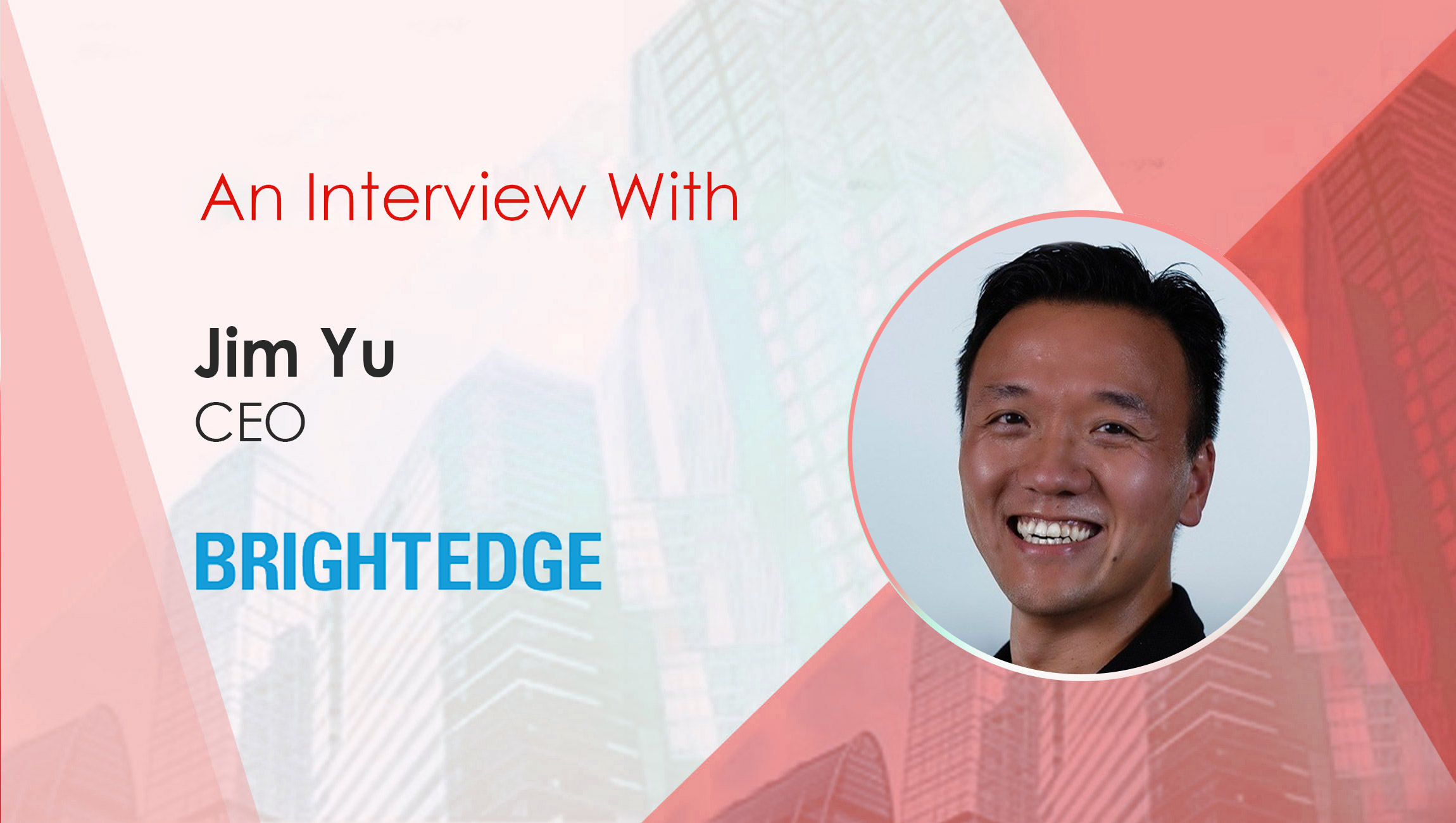Jim Yu, CEO at BrightEdge talks about some of the industry’s dominating Influencer marketing and martech/SEO trends:
__________
Welcome to this MarTech Series chat, Jim, tell us about your B2B tech journey so far and more about the story/inspiration behind BrightEdge…
From a very young age, I had an entrepreneurial spirit and a passion for technology. I ran a neighborhood lawn mowing business as a child and built my first computer program at six-years-old. I enrolled in college full-time when I was just twelve, graduated from the University of South Dakota at sixteen and later earned my MBA before starting a career in product management at Salesforce .
In the early 2000s, I witnessed the SaaS landscape change — businesses began to view technology as a tool. At the same time, traditional media outlets let go of writers resulting in the explosion of search engines. Suddenly, brands needed a way to produce content for new avenues like Google, so I founded BrightEdge with Lemuel Park. Together, we created an SEO platform explicitly designed for large companies’ digital marketers. More than fifteen years and with 1,700+ global customers later, we’ve continued to develop our platform while adjusting to consumer behaviors and market trends.
How have you been seeing influencer marketing norms change across the B2B/B2C domains and what predictions do you have for this space?
In addition to helping build customer trust and increasing sales, influencer marketing has become an avenue for brands to build their reputations and become reliable information sources within their industries. Brands with a robust influencer marketing strategy focus on tracking, strategizing, campaign creation and especially SEO.
As influencers evolve and new platforms surface, SEO will become an even more vital aspect of influencer marketing strategies.
How can brands today align their influencer marketing/SEO strategies to drive better overall results? A few ways in which you’ve seen leading brands do this?
Brands that align their influencer marketing and SEO strategies can improve site engagement, rank higher in the SERPs through a natural off-site strategy and ensure customers trust their brand.
One way leading brands align their influencer marketing and SEO strategy successfully is by leveraging backlinks. When influencers feature a brand’s product on their social media, they generate additional backlinks for the website and more traffic to the brand, thus leading to a better website authority. In addition to sharing on social, most influencers are likely to have their own platform, which provides another avenue for referral traffic or link.
While driving better results, leading brands that utilize influencers for content creation also save time and money, which benefits ROI while increasing brand presence. Influencers can create clickable content by sharing links on their social platforms or websites. Since they have an audience of their own, they reach a new set of customers.
Why do you feel influencer marketing is set to stay for the long term?
The influencer marketing space shows no signs of slowing down and is expected to grow by more than $16 billion this year,. One reason for this continued growth is that the ways influencers can share content are growing and becoming more elaborate, similar to SEO, which has shown it can stand the test of time. Additionally, brands are always looking to reach new audiences, which can quickly be done with influencer marketing — making it a vital marketing tool for today and the future.
Five things you’d tell everyone in B2B marketing to change about their influencer marketing strategy?
Here are five things B2B marketers should change about their influencer marketing strategy:|
- Collaborate only with influencers who have an audience that aligns with the brand.
- Set clear goals and requirements at the beginning of the partnership.
- Define campaign metrics and frequently report on those metrics.
- Optimize all social media content and repurpose it.
- Ensure influencer marketing campaigns align with other marketing strategies.
A few thoughts/predictions on the future of martech and how you feel this space will shape up and evolve further over the years.
Consumer behavior is as unpredictable as ever, making SEO a critical source of business intelligence that fuels digital and omnichannel marketing success. Marketers must also utilize data more intelligently and become quicker adopters of machine learning and AI.
The future of martech will continue to prioritize the customer experience. Whether it’s content creation or dynamic personalization, marketers need to invest in CX technology – a space expected to reach $641 billion this year.
Marketing Technology News: MarTech Interview with Alexa Kilroy, Head of Brand at Triple Whale
What are practical strategies for positioning SEO in your company?
SEO is not just part of the marketing strategy. It plays a vital role in overall business strategy and must be a priority at all times. All departments must recognize the significant impact SEO has on the entire organization. On top of that, to have an accurate analysis of long-term consumer behavior, companies should maintain a solid search program regardless of macro conditions.
How can businesses use SEO to keep a pulse on important shifts within the current economic downturn?
Despite several market fluctuations — including the 2008 recession and current economic downturn — search has continued to climb over the last twenty years. Unlike other social media platforms, businesses can use SEO to gauge customers’ erratic behaviors. During economic downturns, SEO allows them to build their brand presence and earn quick wins that can set them up for future success.
SEO is also reliable because consumers will always continue to search — no matter what’s happening worldwide and what trends come and go. The consumer insights from search will never end.
Marketing Technology News: DoubleVerify Launches New Attention Lab to Help Advertisers Maximize Campaign Performance
How can brands use organic search to mobilize against competitors in an uncertain economic landscape?
Search can give brands insight into consumers that businesses can’t get anywhere else, which is vital for mobilizing against competitors in an uncertain economic landscape. Last year, a BrightEdge study showed that 90% of companies plan to expand their SEO investments in 2022, so organizations that don’t expand their efforts will get left behind.
SEO is an essential source of business intelligence, and it can’t be emphasized enough: SEO has to be a companywide initiative. Like a focus group, SEO has a consistent proliferation, which is excellent for demand and insights. SEO is a channel that’s constantly getting richer with insights. Lastly, SEO is the most cost-effective acquisition channel and reaches customers when they are in a state of need.

The BrightEdge Content Performance Marketing platform helps brands Target Demand, Create and Optimize Content, and Measure Results to win on the content battleground. BrightEdge transforms online content into tangible business results, such as traffic, revenue, and engagement.
Jim Yu is the CEO at BrightEdge
Missed The Latest Episode of The SalesStar Podcast? Have a quick listen here!
Episode 138: Marketing and Ops Tips for B2B Teams with Camela Thompson, VP Marketing at CaliberMind
Episode 137: Sales and Revenue Ops Best Practices with Jamie Shanks, CEO of Pipeline Signals & Sales for Life
Episode 136: Driving Sales Revenue Despite Recessionary Times with AJ Bruno, Founder and CEO at QuotaPath











